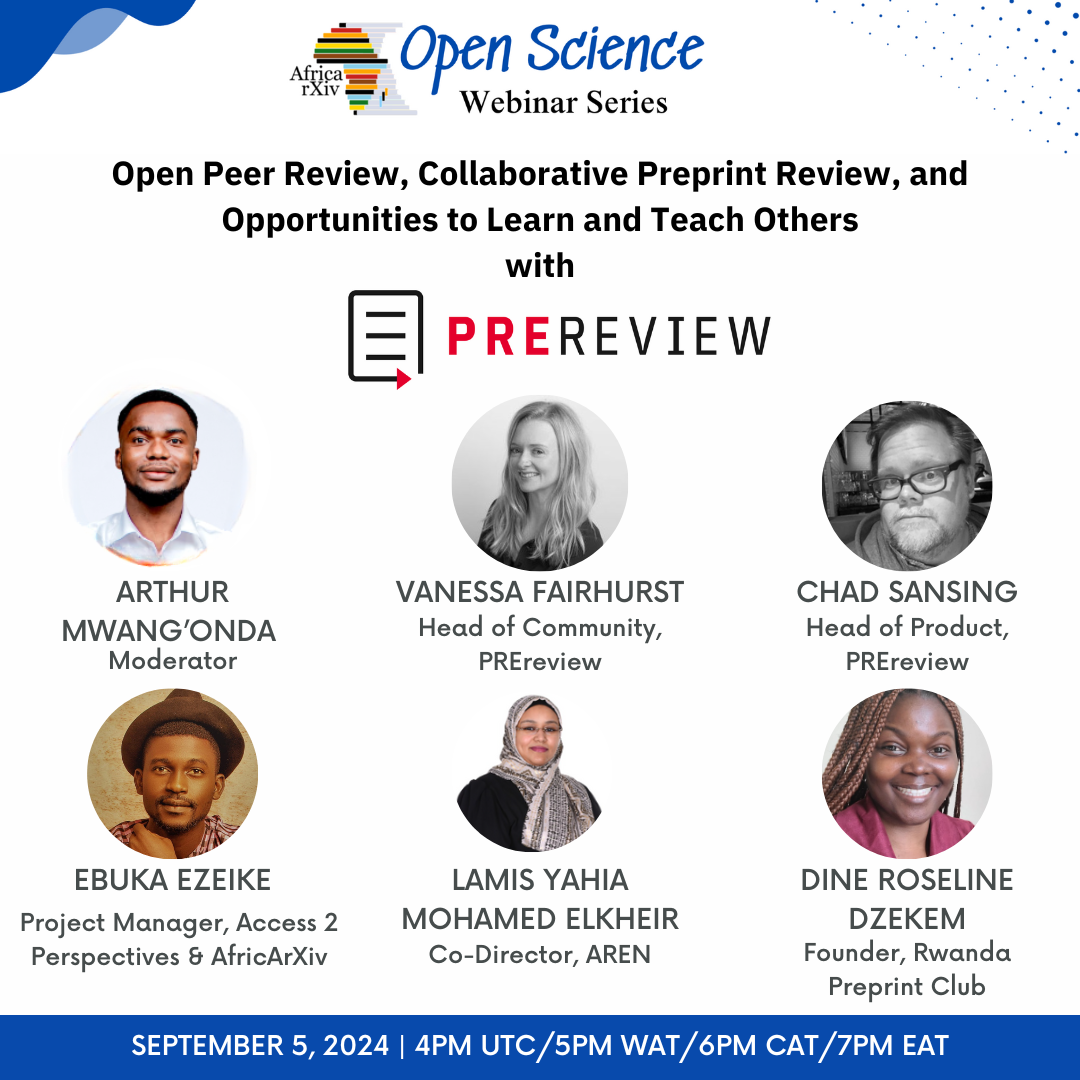
In this webinar, we discussed the benefits of open peer review and how researchers can work together to review preprints. Vanessa Fairhurst and Chad Sansing from PREreview also shared opportunities for learning and teaching within the research community.
Some members of the 2024 PREreview Champions Program also joined to share their experiences of working with PREreview in the African research context.
This session provided a great opportunity to understand more about collaborative review processes and their positive impact on science.
This webinar series is co-organized by: UbuntuNet Alliance: https://ubuntunet.net/ and Access 2 Perspectives: https://access2perspectives.org/ as part of the ORCID Global Participation Program: https://info.orcid.org/global-participation-program/
We look forward to seeing you there!
Watch the recording
The slides are available here: https://africarxiv.ubuntunet.net/handle/1/1655
The recording of this session can be found here:
Speakers’ profiles:

Head of Community, PREreview
ORCID ID: 0000-0001-8511-8689
Vanessa joined the PREreview team in November 2022. She studied her undergraduate degree in European Languages and Business Management before going on to study her Master’s in Applied and Professional Ethics. She began her career in academia working at international development organization INASP with a focus on improving access to scholarly information and research in developing countries. She then went on to support publishers around the world as Community Engagement Manager at Crossref building a global ambassador team and collaborating with others to ensure that scholarly research metadata is registered, linked, and distributed. Openness, accessibility, and equity have always been central to Vanessa’s work, and she greatly enjoys supporting and empowering researchers to improve the research process in her role as Head of Community at PREreview.

Head of Product, PREreview
ORCID ID: 0000-0002-1472-1824
Chad joined the PREreview team in late October 2022. Prior to joining PREreview, he worked for the Mozilla Foundation in a variety of roles, most recently as a program manager on the MozFest team. While at Mozilla, Chad worked on several projects including its web literacy curriculum, Open Leadership Framework, Open Leaders program, and community and program management for the MozFest Trustworthy AI Working Group and the Facilitator and Volunteer communities at MozFest. Before that, Chad taught middle school for 14 years and helped found two small public schools for non-traditional learners. He is passionate about helping people discover their individual and shared capacities for social good and positive change. Outside work, you can find him reading, playing games, and hanging out with friends and family.
Dine Roseline Dzekem
Founder, Rwanda Preprint Club
ORCID ID: 0000-0002-8210-9258
Miss Dine Roseline Dzekem is a public health professional and social scientist in her early career. She has a background in sociology and anthropology from the University of Buea-Cameroon (2016) and a Master’s degree in public health from the University of Rwanda (2019). Her areas of interest have been Sub-Saharan African public health and social issues, such as infectious diseases, healthcare access, community engagement, and mobilization. Roseline created the Rwanda Preprint Club because she is particularly interested in open science and access. Roseline intends to leverage her network and learning opportunities to produce culturally acceptable solutions and enhance health outcomes and scientific communication in African communities by combining her skills in implementation research and community involvement.
Lamis Yahia Mohamed Elkheir
Lecturer at the University of Khartoum and a Co-Director of the African Reproducibility Network (AREN).
ORCID ID: 0000-0002-3516-334X
Lamis Yahia Mohamed Elkheir is a Lecturer at the University of Khartoum and a Co-Director of the African Reproducibility Network (AREN). Currently finalizing her PhD in Medicinal Chemistry, Lamis also holds a Master of Science in Molecular Medicine and a Bachelor of Pharmacy. She is a dedicated Research Assistant at the Mycetoma Research Center, focusing on pioneering drug discoveries for Neglected Tropical Diseases that heavily impact her community. Lamis’s academic and professional endeavours are driven by her profound commitment to advancing open science and enhancing science communication. She tirelessly works towards bridging the global equity gap in scientific knowledge and fostering an inclusive, accessible scientific community across Africa.
Ebuka Ezeike
Project Manager, Access 2 Perspectives and AfricArXiv
ORCID ID: 0000-0003-3452-0306
Ebuka Ezeike is a physicist from the Federal University of Technology Minna, in Niger state, Nigeria.
With a background in physics and over half a decade of experience as an educator in the field, Ebuka brings a wealth of knowledge to his endeavors. His expertise extends to freelance work, where he delivers writing services, including articles and blog posts. Additionally, he manages two academic podcast shows refining audio and video content, including transcriptions.
Passionate about open science hardware, Ebuka Ezeike has been an active member of the Africa Open Science Hardware (AfricaOSH) and the Gathering for Open Science Hardware (GOSH) communities since 2022. In collaboration with GOSH, he organized an impactful open science hardware workshop in 2023, held in Abuja, Nigeria.
Presently, Ebuka serves as the project manager for Access 2 Perspectives, where he coordinates various initiatives, including the African publishing platform AfricArXiv, aimed at enhancing the accessibility of research originating from and about Africa.
Daniela Saderi
Co-Founder and Executive Director, PREreview
ORCID ID: 0000-0002-6109-0367
Daniela Saderi is the Co-Founder and Executive Director at PREreview, an open project dedicated to empowering systematically disadvantaged scientists by providing them with enhanced opportunities to find their voice, receive training, and engage in scholarly peer review. Under her leadership, PREreview develops and implements mentoring programs, organizes community events, and builds open-source infrastructure to support thriving academic communities.
Daniela holds a Ph.D. in Neuroscience from Oregon Health & Science University, Portland, OR, USA, and a Master’s in Neuroscience from the University of Trieste, Italy. Her extensive experience includes roles as a Mozilla Fellow for Science, focusing on fundraising, community building, facilitation, and program and product management.
Driven by a vision of leveraging collective intelligence in unprecedented ways, Daniela aims to challenge and dismantle systems of oppression such as white supremacy culture, heteronormativity, and patriarchy. She actively encourages innovators to recognize these challenges and collaborate towards transformative societal change.
Questions that would be addressed during the session
1. How can African researchers and research institutions integrate PREreview’s platform into their workflows to enhance the visibility and impact of their preprints?
2. What are some success stories or case studies of African researchers or institutions utilizing PREreview for collaborative preprint review, and what lessons can others learn from them?
3. Are there specific resources or support mechanisms PREreview offers to facilitate the training of African researchers in effective peer review practices?
4. How does PREreview address language diversity and accessibility challenges that may affect African researchers’ participation in collaborative peer review processes?
5. In what ways can African researchers and institutions contribute to shaping the future development of open and transparent peer review practices through initiatives like PREreview?
Related resources
- PREreview’s website: https://prereview.org/
- Project collection for Open Peer Reviewers in Africa, : https://africarxiv.ubuntunet.net/handle/1/1536
About the webinar series
This webinar was co-organized by UbuntuNet Alliance and Access 2 Perspectives as part of the ORCID Global Participation Program.
ORCID is the persistent identifier for researchers to share their accomplishments (research articles, data, etc with funding agencies, publishers, data repositories, and other research workflows.
AfricArXiv is a community-led digital archive for African research communication. By enhancing the visibility of African research, we enable discoverability and collaboration opportunities for African scientists on the continent as well as globally.
Benefits of PREreview
- Collaborative Preprint Review:
- Enhancing Research Quality through Open Peer Review: PREreview facilitates open peer review, allowing researchers to receive constructive feedback from the global research community. This can significantly improve the quality and robustness of their manuscripts before formal submission to journals.
- Researchers can engage in collaborative preprint review, which fosters a sense of community and collaboration among scientists. This can be especially beneficial for early-career researchers who gain insights and mentorship from more experienced peers.
- Opportunities for Learning and Skill Development:
- PREreview offers training and resources on how to conduct peer reviews. Researchers can develop critical skills in evaluating and critiquing scientific work, which is valuable for their academic and professional growth.
- Visibility and Recognition:
- Engaging in open peer review on PREreview provides visibility to researchers’ contributions to the scientific community. This can enhance their professional reputation and open up opportunities for networking and collaboration.
- Support for Preprint Culture:
- By participating in preprint reviews, African researchers contribute to the growing culture of preprints, which promotes rapid dissemination of research findings. This can be particularly advantageous for time-sensitive research or emerging fields.
- Access to Diverse Perspectives:
- The global and inclusive nature of PREreview means that African researchers can receive feedback from a diverse range of reviewers, helping to identify and address potential biases and improving the overall quality of their research.
- Promoting Open Science:
- PREreview aligns with the principles of open science by encouraging transparency and openness in the peer review process. African researchers and institutions can support and benefit from these practices, which are increasingly valued in the global research landscape.
- Building a Supportive Research Community:
- Engaging with PREreview can help build a supportive network of researchers who are committed to improving science together. This community can provide emotional and intellectual support, which is crucial for sustaining long-term research efforts.
By leveraging these services, African researchers and institutions can enhance their research impact, improve their skills, and contribute to a more open and collaborative scientific environment.
